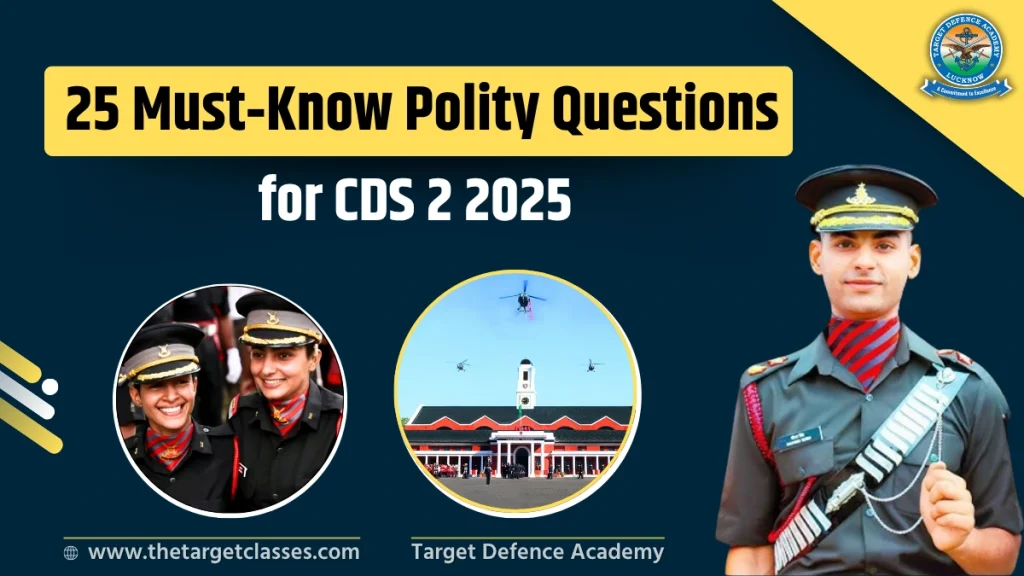Here are 25 important polity questions for CDS 2 2025, in conjunction with quick motives and steering on the way to address similar queries for your exam preparation. These are curated from recent compilations and previous-year trends to boost your scoring potential:
1. Constituent Assembly structure
Q: Who becomes no longer a member of the constituent meeting?
Ans. Prominent names, inclusive of Rajendra Prasad, KM Munshi, and Abul Kalam Azad, are included.
2. Untouchability and civil rights laws
Q: Arrange these Acts chronologically: Untouchability Offences Act, Protection of Civil Rights Act, Communal Order of Govt. of Madras, etc.
3. Disqualification decisions
Q: Who makes a decision on the disqualification of MPs?
Ans. The Election Commission is in session with the Speaker/Chairman.
4. Supreme Court appellate jurisdiction
Q: Which falls under SC’s appellate jurisdiction?
Ans. Civil, criminal, and constitutional appeals.
5. Rajya Sabha quorum
Q: Minimum quorum for Rajya Sabha?
Ans. 50 members.

6. Habeas Corpus writ
Q: Which writ frees someone illegally detained?
Ans. Habeas Corpus.
7. Presidential election electorate
Q: Who doesn’t vote in the Presidential election?
Ans. Nominated Rajya Sabha members.
8. First Law Officer
Q: Who is the first law officer of India?
Ans. Attorney‑General of India.
9. Zero Hour in Parliament
Q: What is “Zero Hour”?
Ans. The period immediately after Question Hour.
10. Citizen-only rights
Q: Which rights are only for citizens?
Ans. Freedom of speech & expression, right to form associations, peaceful assembly.
11. Parliament procedures
Q: Which are Indian-origin practices: Zero Hour, Calling Attention Motion, Adjournment Motion, Censure Motion?
Ans. Often Zero Hour & Calling Attention.
12. Governor’s ordinance validity
Q: Governor’s ordinance lasts how long?
Ans. 6 weeks after the next legislative session starts.
13. Presidential impeachment support
Q: Impeachment motion needs what majority?
Ans. 2/3 of members present and voting.
14. Anti‑defection for independents
Q: Independent MP joins a party when disqualified?
Ans. Yes, membership forfeited.
15. Special majority calculation
Q: In the Lok Sabha of 542 members with 300 votes, the special majority threshold is?
Ans. 2/3 of 300 = 200 votes.
16. Parliamentary session gap
Q: Maximum gap between two Parliament sessions?
Ans. 6 months.
17. Residuary powers
Q: Who holds residuary powers?
Ans. Union Parliament (Lok Sabha).
18. Speaker’s voting right
Q: Speaker votes when?
Ans. Only in case of a tie.
- CDS Syllabus 2026 (PDF) – Maths, English and GK Syllabus
- CDS 1 2026 Notification PDF – Eligibility Criteria and Exam Pattern
- CDS Eligibility 2026 – Age Limit, Height and Weight
- List of Top 5 NDA Coaching in India | Best NDA Coaching in India
Why these questions matter
- High frequency in recent CDS exams
- Objective and factual – easy to prepare and score
- Core concept clarity helps in both the written test and the SSB evaluation
Preparation Tips
- Revise key articles and constitutional terminologies
- Solve previous year papers & sample tests regularly
- Use quick-revision charts for rights, articles, motions, and amendment acts
Conclusion
By revising and expertly addressing these questions with clarity, you’re efficiently protecting the excessive-yield polity portion of the CDS syllabus. Drill these and similar ones regularly—your improvement will be evident in scoring and confidence!
FAQs for Polity Questions for CDS 2 2025
Ans. Indian polity is a high-load section in the general knowledge paper. Understanding large concepts can help you score well with minimal effort.
Ans. Questions are genuine and idea-based, masking Constitutional provisions, Articles, Schedules, Fundamental Rights, DPSPs, and Parliament.
Ans. On average, 12–15 questions are from Polity in the CDS General Knowledge paper.
Ans. Fundamental Rights & Duties
Parliament & its functions
President & Governor’s powers
Emergency Provisions
Constitutional Amendments
Judiciary structure
Panchayati Raj
Election Commission
Directive Principles of State Policy
Union-State relations
Ans. M. Laxmikanth’s Indian Polity
NCERTs (Class 9–12 Political Science)
Monthly magazines for current polity developments

